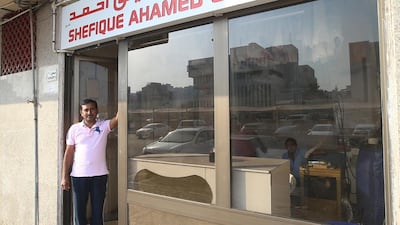It was only when he arrived in Delhi one September day in 1997, that Zaheer Ahamed realised he was going to work in his brother Shoaib’s Abu Dhabi laundry. Until that point, when someone pointed it out to him on his visa, he had assumed he was coming to work as an office messenger.
“I was at a crossroads – there was simply no place for me to return to. And if I went on [to the laundry] I felt my life would be ruined,” says the 43-year-old father of three.
But Zaheer ultimately took the flight to the UAE. “I decided to not look back,” he tells me.
Zaheer comes from India's northern Uttar Pradesh state, where I'm also from, and now and then we've struck up a conversation. We are chatting on plastic chairs outside his shop, Shefique Ahamed Laundry, behind The National offices off Muroor Road.
It’s a hot summer night and he fans himself with a handkerchief as we talk. Zaheer doesn’t speak English and our conversation is in Urdu, so I ask who will read this piece back to him. “We will manage somehow,” he says.
Zaheer’s brother Shoaib came to Abu Dhabi on a company visa and was then able to set up a laundry.
They come from a family of farmers. “Laundry is not our profession but someone advised him that it would be easy to get into. And he won’t have to work for anyone else.”
“You will be your own ‘mukhtar’ [boss], he was told.”
“I liked to study as a boy – I always came first or second in class. I was really keen on becoming a doctor. I narrowly missed qualifying ... in Allahabad.”
An administrative error which resulted in the date of birth on his passport not matching his education certificates meant that Zaheer’s options were limited when he left school. Forged or fake documents are a big problem in India and, he suggests, he would have found it difficult to prove the qualifications were genuinely his.
“If my parents were alive, they would never want me to work as a ‘dhobi’ [laundry man].”
Zaheer worked for Shoaib for three years and then started his own laundry. Zaheer and another brother Shefique, whose name is lit up on the hoarding, now have two newer shops on the same road.
“I used my earnings to build a home for myself and to get married,” he says.
His family – a wife and children – live in Mumbai, where he has rented a one-bedroom flat.
“My parents died when I was young. So, when we were married, my wife told me she wanted to live in Mumbai, with her father and nine brothers and sisters.” In his village, women can’t leave the house. “Who would take my kids to school?” Zaheer asks.
Now regulations have raised a question mark over his local business, as his shop is considered too small. “My livelihood is in question once again,” he says.
“We have two shops. Now, we might have to depend on one. Rents are going up by Dh10,000 every year. We pay Dh60,000 now but there isn’t enough work to go around. If things remain like this then we will be forced to close down.”
He has been at the shop for fifteen-and-a-half years. “Mostly expats come to us now. Emiratis, not so much,” he says, explaining that many have moved away to different areas.
There is also passing trade. Zaheer indicates to an SUV parked outside the shop and says: “He’s from Dubai. He gave us a ghutra, we will have it ironed and then he will leave.”
Rising rents have made operating a business much harder, Zaheer says. “After bills and wages I don’t have much left. That’s the situation now.
“If I had to set up shop again, I would not be able to. What I started with, Dh22,000, would require between Dh500,000 and Dh600,000 now. Even if I had the money, there’s no guarantee it would succeed.”
He says he makes between Dh1,000 and Dh1,500 a month, and manages to send home 15,000 to 20,000 rupees (Dh825 to Dh1,100). He needs to work because his children are still young.
“I’ve already given this place 20 years of my life.”
He has a 12-year-old son and two daughters, aged 7 and 4. “Because I wanted to be a doctor and couldn’t become one, I had the desire that one of my children might become a doctor. But I can’t force them.”
However, his eldest daughter wants to study medicine. “My son says he won’t study after Grade 10. Why? Because he wants to be a cricketer.”
Azar Zaidi is a production journalist at The National.

